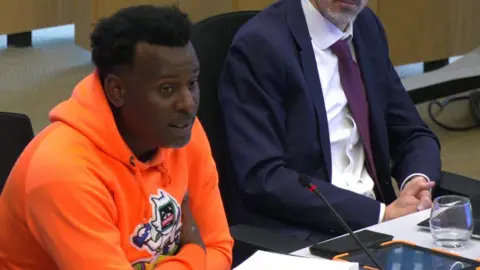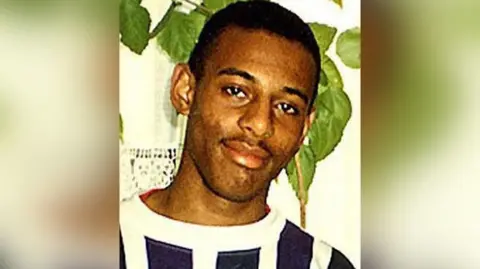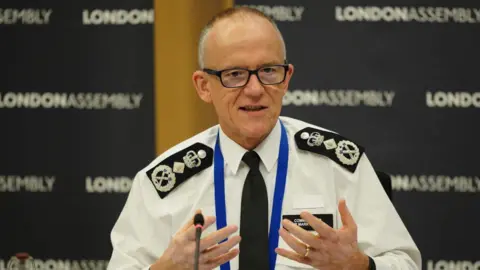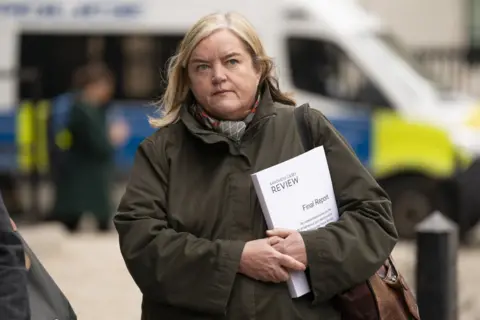Stephen Lawrence brother: Time ticking for Met reform
 London Policing Board
London Policing Board The brother of murdered Stephen Lawrence says Londoners are not getting the police service they deserve, adding "time is ticking" for the chief of the Metropolitan Police to make reforms.
Stuart Lawrence says he believes the London Policing Board, which was set up last September to monitor the force, is becoming a space for it to get a "pat on the back".
Speaking to Eddie Nestor on BBC Radio London, Dr Lawrence, who had a 15-year career as a teacher and has worked for the Home Office and at HMP Belmarsh, is one of 17 members of the oversight panel.
In 1999, a public inquiry found the first investigation into the racist murder of 18-year-old Stephen in south London in 1993 had been "marred by a combination of professional incompetence, institutional racism and a failure of leadership by senior officers".
Dr Lawrence's comments come one year after another damning review, by Baroness Casey, into failings within the force, which found it to be institutionally racist, misogynist and homophobic.
The report made 16 recommendations, including the creation of the London Policing Board to "oversee and scrutinise" the implementation of those reforms.
Dr Lawrence says he had taken time to carefully consider whether he should join the panel.
 PA Media
PA Media"Then I thought to myself, 'well, who else?'," he explained. "Who else can maybe give some insight of an experience that you go through, that you hope no-one goes through?
"I've seen in my time, through all of this, six or seven commissioners come through, and all promised to do something different and all promised to make the change I'd like to see.
"And none of them so far have been able to do it. So, I thought to myself, let me see. Let me go on the other side of the fence."
But he said he now had concerns about whether the meetings were allowing the "voice of Londoners" to be heard, and believed instead it had become a place for the Met to receive "a pat on the back."
"Baroness Casey said that these meetings shouldn't be where the Met keeps coming and says 'this is what I've done, and this is how well I've done it'," Dr Lawrence continued.
'We need to do better'
"And, so far, those first three meetings have been just that. In my opinion, we need to do better. "
He called on the Met to draw on the knowledge and skills of the board members, asking them for solutions to the problems faced by the force.
"We've got expertise in all different fields of experience, people who've been through the system, data analysts, an ex-police officer himself. All these experiences and knowledge should be tapped into more."
Dr Lawrence said he was also concerned by the current Met Police chief's refusal to accept the term "institutional" to describe the racism, misogyny and homophobia outlined in the Casey Review.
Commissioner Sir Mark Rowley previously said the word had become "politicised" and "ambiguous" and could be misunderstood, although he recognised there were systemic and cultural failings, which he promised to address.
Dr Lawrence said, at first, he thought it was "just words", but now believed Sir Mark should accept the term because it would "draw a line in the sand".
"Until he understands the power of those words, by admitting the past failures, I really don't see how we're going to move forward in a real strong, positive direction."
 PA Wire
PA WireHowever, Dr Lawrence agrees there has been some progress, including improvements in meeting targets for answering emergency and non-emergency calls.
He has also welcomed the reforms set out in the New Met for London plan, but said he did not want concerns over funding to be used as an "excuse" not to implement them.
The commisssioner has previously warned of a £250m funding gap and, earlier this month, told the London Policing Board the force was short of about 1,400 officers, as it struggled with recruitment.
"At the moment, the budget is causing us to compromise in terms of what we can deliver operationally and on the speed of reform," Sir Mark Rowley said.
'Londoners not getting what they deserve'
Dr Lawrence believes the force's reputation is the Met's "biggest hurdle" in persuading new recruits to sign up, and that it needs to demonstrate it is getting rid of corrupt officers.
"If you don the uniform of a Met officer, you need to be the best of the best of society."
He said he wanted to hear more about what the force would do to support "all those amazing officers, that have gone beyond the call of duty."
He is calling for better neighbourhood policing, with officers who can build positive relationships with the community: "At the moment, I do not believe that Londoners are getting what they deserve."
The Met has said it will recruit 500 more police community support officers and put more officers into local neighbourhoods to work closely with communities.
A spokesperson for London's Labour mayor Sadiq Khan, who chairs the policing board and is standing for re-election in May, said the Met was "on the path to wholesale reform", but there was still a long way to go.
“The new independent policing board includes leading experts in frontline policing and law, and has strong representation from London’s diverse communities who have been historically let down by the police.
"They continue to use their regular meetings in public to provide robust challenge to the Met commissioner," they added.
 PA Wire
PA WireBut the Conservative's mayoral candidate, Susan Hall, said the policing board should have been appointed by an independent panel.
"Sadiq Khan nobbled the policing board, adding in some of his Labour activist friends and excluding anyone who might cause him problems," she said.
She accused him of "shutting down scrutiny of the Met Police before the election."
Green party candidate Zoë Garbett said it was "inexcusable" for the Met commissioner to not accept the force was institutionally racist.
“The New Met Plan for London is a good start, but I want to see the police working listening to local communities to understand local priorities and working to those. That will be a big step towards improving trust in our police force.”
Liberal Democrat candidate Rob Blackie said the mayor had made “no or only slow progress" on addressing the key issues in the Casey Review.
“Sadiq Khan has promised to reform the Met and restore Londoners’ trust. But since these pledges, detection and conviction rates have plummeted and public trust in the police has fallen."
Sir Mark described the publication of Baroness Casey's report as "a sobering moment for Met".
He has promised Londoners will see change, but warned it will take time: “The scale of change required means there is still much more for us to do.
'Time is ticking'
"Only through continued, consistent evidence of fundamental change will trust in us continue to be restored.
"Day by day, week by week, we will continue to become the service London deserves.”
In her report, Baroness Casey recommended the Met was re-inspected after two years, and again after five.
Dr Lawrence said while he understood this, he hoped to meet with Sir Mark to "ask him some questions".
"Time is ticking on the rest of his tenure, and what is the rest of that going to look like?"
He said his decision to join the board was driven by a determination to help Londoners have a better police service, and he wanted assurances that its work would make a difference.
"I want this to be better. I need this to be better.
"You can be really negative about something, or you can go, you know what, let me roll my sleeves up. Let me try. I'm trying to help them to be better, because I want them to better."
